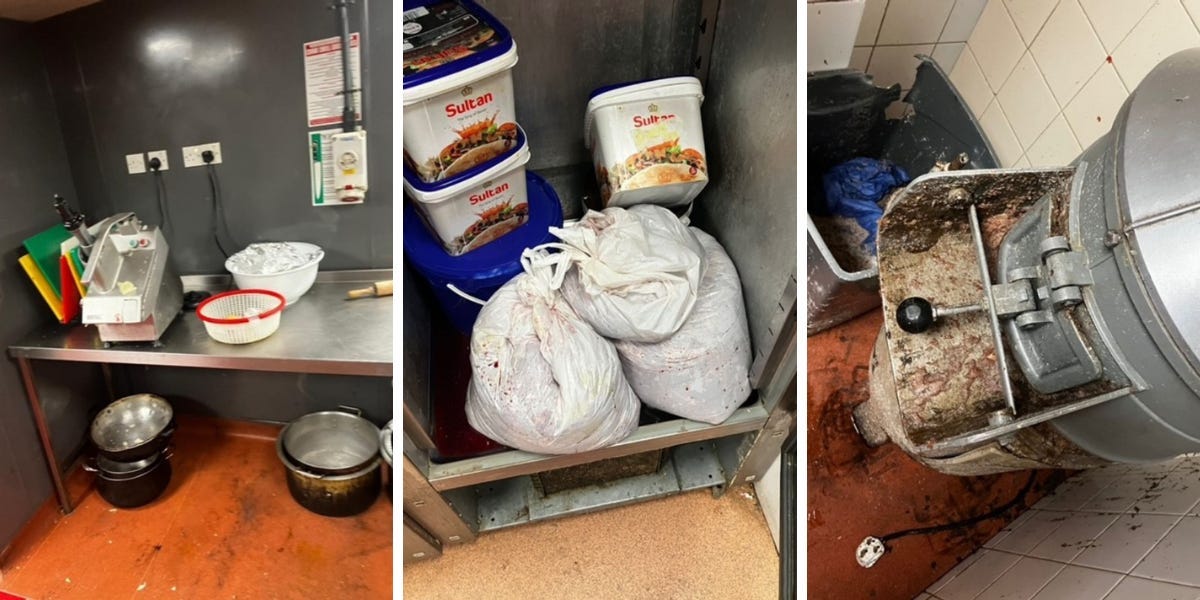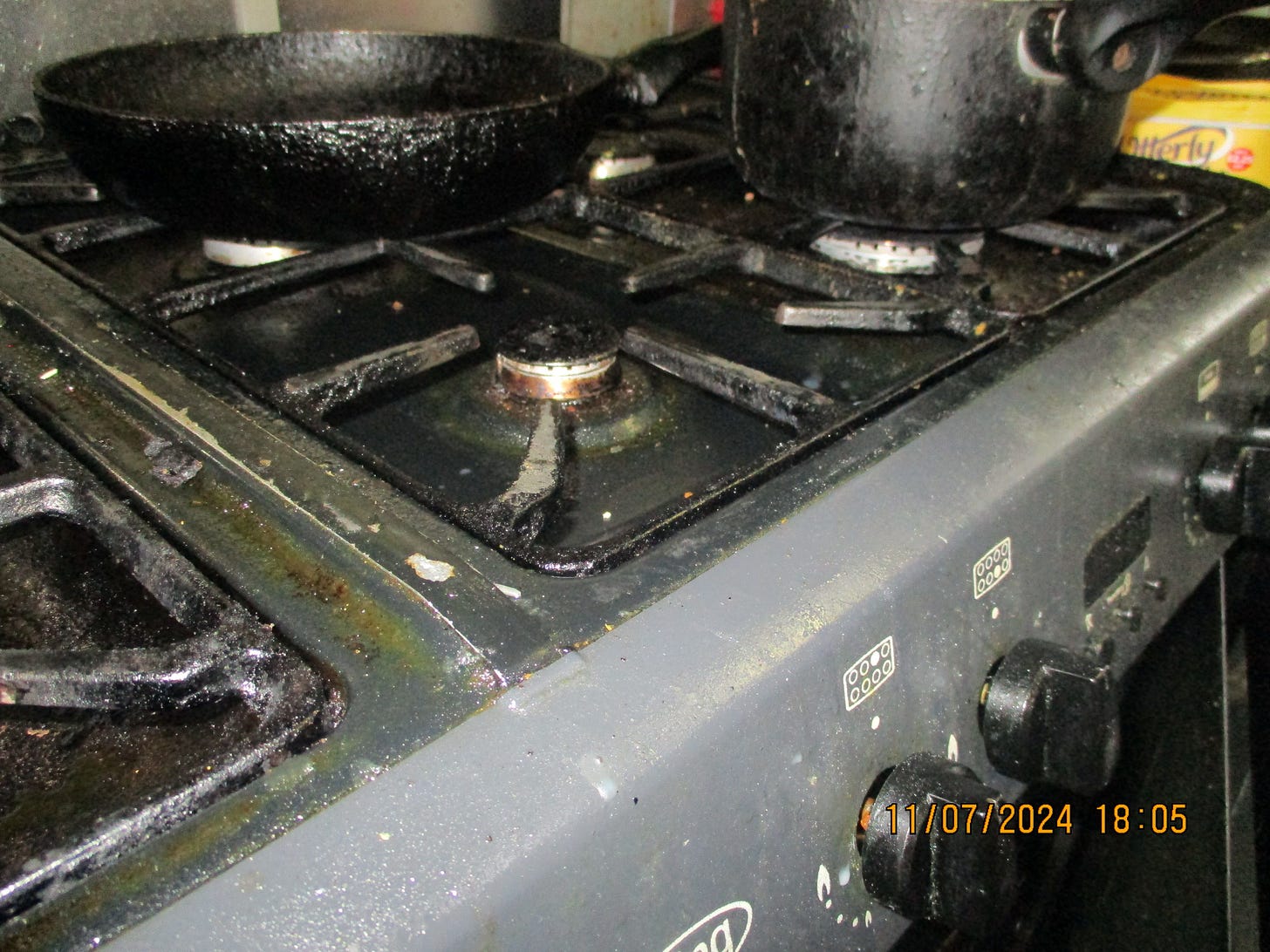Inside Blackpool Council's tougher approach to food hygiene breaches
PLUS: A new report which focuses on Blackpool pupils has revealed how use of smart phones is damaging reading skills.
Hello and welcome to The Blackpool Lead.
Throughout our existence, we’ve reported pretty extensively on businesses that have fallen short when visited by food safety inspectors by Blackpool Council.
It’s a rough time for hospitality, and we don’t do this to stick the boot in but instead to allow our readers to make informed decisions on where they choose to eat. As our investigations show - the vast majority of businesses facing the same challenges achieve the highest score when inspected.
And Blackpool is actually out-performing when it comes to food safety - so we’ve looked into why that might be and what the data actually is about food safety across the town.
Tougher approach to food hygiene by Blackpool Council showing in the results
By Luke Beardsworth
Enforcement action has been ramped up in recent years as Blackpool Council takes a tough approach to dealing with poor food hygiene, figures obtained by The Blackpool Lead have revealed.
No area in Lancashire has more food businesses to inspect than the food safety officers at Blackpool Council with 1,688 as of February this year. The next closest is 1,362 in Preston with the lowest being the Ribble Valley at 572.
But after making zero prosecutions and one enforced closure between 2019-2021, the 2022-2024 period has seen the council undertake seven prosecutions against businesses and advise seven voluntary closures.
A voluntary closure might happen when a business receives a food hygiene inspection that raises issues that could result in legal action if they are not resolved quickly. Businesses are often provided the opportunity to close voluntarily to resolve these issues.
In 2022, the cost of bringing four prosecutions against businesses to the taxpayer was £8,360, all of which was recovered during legal proceedings.
In 2024, three cases had a total cost of £6,013.44, and the amount recovered during proceedings was £4,973.32.
How Blackpool compares and why
Research by Public Health Nutrition carried out in 2013 found the likelihood of poor instances of food hygiene in businesses increases significantly in local authorities with higher levels of deprivation.
Data from the English Indices of Deprivation 2019, which examines deprivation in small areas or neighbourhoods, found that eight of the ten most deprived areas in the UK are in Blackpool.
But in respect of this particular correlation between deprivation and instances of poor hygiene, Blackpool defies the trend. Of Blackpool’s 1,688 food businesses subject to inspection, just 1.54% received a score of zero or one - the scores that would typically mean legal action can be considered if problems persist.
This compares favourably with Blackburn with Darwen where 4.71% of businesses are rated at zero or one, Pendle with 6.40% or even neighbouring Wyre where 3.46% of businesses could face legal issues.
The Blackpool Lead asked what Blackpool Council believes it is doing to have a low number of low-rated eateries compared to some other areas in Lancashire and why the council has taken a harder line on businesses in recent years.
It attributed the absence in prosecutions in previous years to variables such as staffing issues at the authority or even that no businesses required enforcement.
A spokesperson for Blackpool Council said: “It is credit to the hundreds of food businesses across the town that ratings remain consistently high.
“The primary focus of our Food Control team is to educate and advise businesses to ensure that they are operating safely and within the law.
“This statistic shows that in the vast majority of cases Blackpool businesses are operating well which is fantastic news for consumers.
“In instances where operators disregard the law, creating a health risk, we do not hesitate to take enforcement action.”
The Blackpool Lead understands that the typical approach taken is that if a business closes voluntarily to make improvements - and those improvements are implemented effectively - the council would prefer to take the decision not to prosecute.
Prosecution is then considered if the council believes that a business is persistently falling short of the standards demanded by law under the Food Safety and Hygiene (England) Regulations 2013 Act.
Previously, The Blackpool Lead had been told by Blackpool Council that they hope action like this deters businesses from operating in a way that puts the public at risk.
Perhaps unsurprisingly given the research above, neighbouring Fylde has 1.1% of its 847 businesses rated at zero or one.
Eat Indian
An investigation by The Blackpool Lead in 2024 uncovered that Eat Indian had been hit with a zero food hygiene rating shortly after opening in June .
They voluntarily closed to bring into action a number of improvements and when The Gazette asked them why, they blamed the closure on a burst water pipe.
But our investigation found extensive food hygiene breaches had been found in a council visit on July 3 despite only being open for a number of days.
Issues cited in documents, given to Eat Indian after the inspection and obtained by The Blackpool Lead, included placing containers in a pool of blood present in the fridge, hands not being washed and no surfaces being cleaned in the entirety of a one-hour visit and a lack of awareness of cross-contamination risks.
Other issues included food being stored on the floor, employees wearing sandals, vegetables on the fire escape stairs and raw meat being left uncovered.
The business was warned to improve or face prosecution and although they were allowed to reopen soon after - and a reinspection in December improved their rating to a two - The Blackpool Lead understands Blackpool Council was considering legal action.
Blackpool Council did not respond when asked for an update this week.
The Hawkes Hotel
The owner of The Hawkes Hotel, however, was prosecuted after the business was hit with a zero on a visit just days after the visit to Eat Indian.
The Blackpool Lead was initially unsuccessful in acquiring a copy of the food safety officer’s report after Blackpool Council made it clear they intended to prosecute the business owner for the clear flouting of regulations.
But we were later able to report details of the issues that led to such strong measures being taken by the council, including dog hair through the kitchen, dirt and mould in the kitchen and on equipment, open packets of raw bacon in the freezer and, most bizarrely, tattooist needles found in the kitchen.
All of this meant owner Vijayakumar Sarvabowmam Kannan was charged with failing to maintain cleanliness of the premises, maintenance of a food premises, cleanliness to surfaces and the protection of food.
Kannan appeared at Lancaster Magistrates’ Court on 4 February with no legal representation and pleaded guilty to all of the offences. The financial penalty given took into account the fact that he had pleaded guilty on the first occasion.
He was fined £4,576 to be paid within six months, with £1,339 being a fine, £2,702 being costs and £535 being a victim surcharge.
The hotel was understood to be moving into new ownership in the near future.
The bigger picture
While cases like those above are more extreme examples where the council has been forced to take action, the reality is that the majority of eateries in Blackpool perform well.
Of the 1,688 businesses that have been given a food hygiene rating, 1,272 (75.36%) are rated at five out of five. A further 220 (13.03%) are at a four out of five rating.
Lancashire as a whole sees 1.78% of all businesses rated at zero or one, meaning Blackpool has fewer extreme examples of poor food hygiene than is the norm for the county.
Blackpool’s 75.36% of businesses rated at five, however, is slightly below the Lancashire average of 77.57%.
We’re delighted to say Cosy Homes in Lancashire is supporting independent, in-depth journalism in Lancashire by sponsoring The Blackpool Lead and The Lancashire Lead. Discover how they can help you improve energy efficiency in your home and keep it warmer.
Literacy skills at risk by smart phone use, reveals Blackpool study
By Shelagh Parkinson
A new report which focuses on Blackpool pupils has revealed how use of smart phones is damaging reading skills.
The research published this week (March 7) warns a national literacy crisis is being made worse due to children spending more time on social media and video streaming instead of reading.
The report by think-tank Pro Bono Economics (PBE) for the education charity Right to Succeed, found nationally millions of children are entering secondary school without age-appropriate literacy skills.
A quarter of Year 7 pupils have a reading age below 11, and one in five primary school pupils fail to meet expected reading standards which then impacts their chances of finding a good job later in life.
The report ‘Reading the future: the impact of literacy support on disadvantaged pupils’ GCSE grades and beyond’ targeted work on Blackpool and Birkenhead to show how better literacy could boost attainment.
Now calls are being made for continued investment in literacy programmes and more comprehensive data collection to deepen understanding of their impact.
Economists at PBE evaluated the impact of two community-focused literacy programmes: KS 3 Literacy Blackpool and Cradle to Career North Birkenhead which reached more than 5,000 pupils between 2018 and 2023.
Beverly Priestner, Reading Lead at South Shore Academy who works on the Blackpool KS3 Literacy programme to improve reading skills among 11 to 14-year-olds in the town, said targeted projects were working.
She said: “One student during Ofsted was out of his seat volunteering to read Shakespeare, which is like another language, confident and fluent.
“This was a pupil premium lad who used to be running around the corridors in Year 7 and was consistently withdrawn in class. By Year 8 he was at +14 (literacy assessment score).”
Graeme Duncan, chief executive at Right to Succeed, said reading was essential to a pupil’s understanding of their lessons “and the world around them”.
He said: “Yet in low-income communities, children too often start their education behind in reading, and finish their education significantly behind national expectations, reducing their ability to achieve their potential.
“This is why we’re thrilled to show what our schools and partners in Blackpool and North Birkenhead have been able to achieve through working collectively in a systematic way that has led to them co-creating some amazingly impactful practice.”
Thank you for reading The Blackpool Lead this weekend. We’ll now go straight into our recommendations for the week ahead - but we hope you enjoy the rest of your Sunday.
Luke, Ed, Mike, Jamie, Sophie and team
The best things to do in Blackpool from 10 March...
Keep reading with a 7-day free trial
Subscribe to The Blackpool Lead to keep reading this post and get 7 days of free access to the full post archives.






